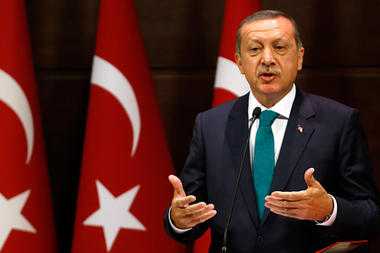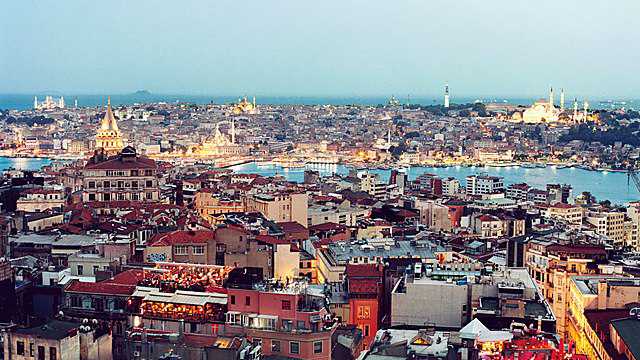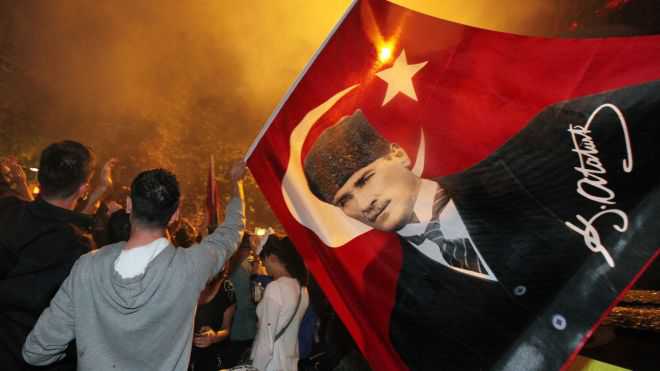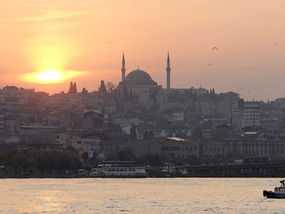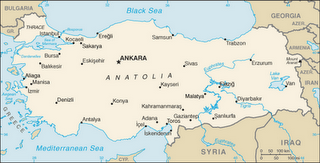Ethnic cleansing and forced migration drove Assyrian Christians out of eastern Turkey decades ago, but Prime Minister Erdogan’s policies have drawn a number of them home.
By Alexander Christie-Miller, Correspondent / October 30, 2013
Turkish Prime Minister Tayyip Erdogan addresses the media in Ankara September 30, 2013. Erdogan announced plans to return monastery property belonging to Syria Christians that was seized by the state.
Umit Bektas/Reuters/File
“A lot of people think we’re crazy for coming back here,” says Mr. Demir of Kafro, a village of 17 Assyrian Christian families who have left comfortable lives in Europe to move back to their historic homeland in southeastern Turkey.
Lured by Turkey’s growing security, prosperity, and strengthened minority rights, around 80 Assyrian families have returned to the region since 2006.Turkey’s Islam-rooted Justice and Development Party, which won power in 2002, has styled itself a protector of religious and minority rights, in contrast to earlier secular governments, which harbored a nationalistic mistrust of minorities.
Still, the transition has been a hard one. Turkey’s Muslim majority and Christian minorities have a fraught, bloody history. The Assyrian community, which once numbered in the hundreds of thousands, was decimated by an ethnic cleansing campaign, forced migration, and fallout from the fighting between the Turkish government and Kurdish separatists.
RECOMMENDED: Who are Egypt’s Copts, and the Middle East’s other Christian populations?
Assyrians are still barred from opening their own seminaries, while priests are still denied the state salary afforded Sunni Muslim imams. They complain of bureaucratic and legal harassment.
But on Sept. 30 Prime Minister Recep Tayyip Erdoganannounced a “democratization package,” for the first time allowing minority groups to open private schools teaching in their own languages. He also agreed to return land confiscated from the 1,600-year-old Mor Gabriel Monastery, which lies eight miles from Kafro and is a talisman for Assyrian Christians worldwide.
RECOMMENDED: Monitor Frontier Markets Free Trial. Intelligent analysis on events in frontier/emerging countries.
There were between 600,000 and 700,000 Assyrians in Turkey prior to the 20th century, but today there are only 20,000 remaining in Turkey, 17,000 of them in Istanbul – most of them relocated from the southeast.
Fraught history
Assyrians who remained in the Midyat area after the World War I ethnic cleansing and forced migration campaign by the Ottomans largely fled in the 1980s, when they were caught in the crossfire between the Turkish army and the Kurdistan Workers’ Party (PKK). With each side accusing them of supporting the other, around 50 to 60 Assyrians were killed, says Aziz Demir, Kafro’s mukhtar – elected village headman.
“We had to make a choice: we were either with the Kurdish people or the state. Of course we could not make this choice, so our only option was to leave.”
Even before the PKK, the Assyrians were frequently targeted amid an atmosphere of general lawlessness. Israil Demir’s father was murdered in Kafro in 1972 while guarding the village from thieves at night. “They never found the killer,” he said. By the late 1980s, the village was entirely abandoned.
During these years, nearby Mor Gabriel was a lonely place, says Isa Dogdu, the vice chairman of the Mor Gabriel Foundation, which runs the monastery.
“It was very dangerous to be here,” he says. The road from the nearest city, Mardin, was marked with a half-dozen aggressively manned military checkpoints. “Only a handful of people would visit: a few journalists and a few pilgrims,” he says.
Turkey’s war with the PKK partially subsided after the capture of the rebel group’s leader, Abdullah Ocalan, in 1999. Currently the two sides are engaged in peace talks. On a recent visit to Mor Gabriel – a fortress-like complex of yellow sandstone in an otherwise empty landscape – has a steady stream of tourists wandering through its cloisters and chapels, mainly Turkish Muslims sightseeing during the national holiday marking the Islamic festival of Eid al-Adha, the Feast of the Sacrifice.
The monastery has survived repeated calamities. It was devastated by plague in the 8th century; attacked by Turks, Kurds, and Persians over the years; and sacked by the Mongols in the 14th Century.
In its heyday during the 7th century, it was home to more than 1,000 monks. Today, while its vaults contain the remains of 12,000 saints and martyrs, the monastery’s only living denizens are the bishop, three monks, and 14 nuns.
The return of a handful of its flock to the Midyat region “lifts our morale and helps us spiritually,” says Mr. Dogdu.
Replanting roots
Mor Gabriel’s more recent travails illustrate the authorities’ mixed attitude towards Christian minorities. In 2008, state bureaucrats stripped it of a large portion of its land after neighbouring Muslim villages claimed title to it. The monastery has fought an unsuccessful court battle for its return ever since.
“The Turks arrived here yesterday, and who was here before? It was us,” says Mr Dogdu. “Logic cannot accept the idea that we have been [illegal] occupiers for 1,600 years.”
Although the government agreed to return 240,000 square meters of Mor Gabriel’s land, 270,000 square meters remain confiscated. Israil Demir and other villagers in Kafro are unimpressed. He points out that it was under the Erdogan government that the land was confiscated in the first place, a move which “showed that the state doesn’t want Assyrians.”
Some villagers in Kafro also expressed unease over the alleged Islamist tendencies of Turkey’s religiously-conservative government. Most conceded, however, that it has done more for them than their secularist predecessors.
Much of the improvement in minority rights in Turkey has been due to the government’s efforts to reform laws after the country began European Union accession talks in 2005. Many reforms relating to freedom of religion had the dual benefit of helping both minorities and pious Muslims, who until recently also faced state-imposed restrictions.
Assyrians were first invited to return in 2001 by then-Prime Minister Bulent Ecevit. The emigrant community, living mainly in Germany and Switzerland, held meetings and sought assurances from the Turkish government before several families decided to return.
Aziz Demir’s was one of the first, in 2006. The transition from Switzerland was particularly hard for his son, Ishok, who had never lived in Turkey.
“I was against the whole project but at 16 you can’t do a lot about these decisions,” Ishok says. “There was no Internet, no café, no streets even… Everything was very strange. We didn’t know what we were doing here. We left our friends behind.”
With more families moving back, the village has slowly become livelier, he says. There is now a café that serves pizza and a small chapel built on the site of an older one. But the sandstorm still cast a pall over the village outside as he showed the Monitor an older ruined church, pointing out graffiti and bullet holes left by Turkish soldiers.
Ultimately, Ishok says, the future of the village, and of Assyrians in Turkey, depends on whether young people like him decide to stay. He, at least, has bought in, recently starting a job as a tour guide around Mor Gabriel and other Assyrian sites in the region.
“I believe in a future here,” he says. “Very slowly we [young people] learned about this place and other families came back and brought children with them and we didn’t feel so alone any more.”

